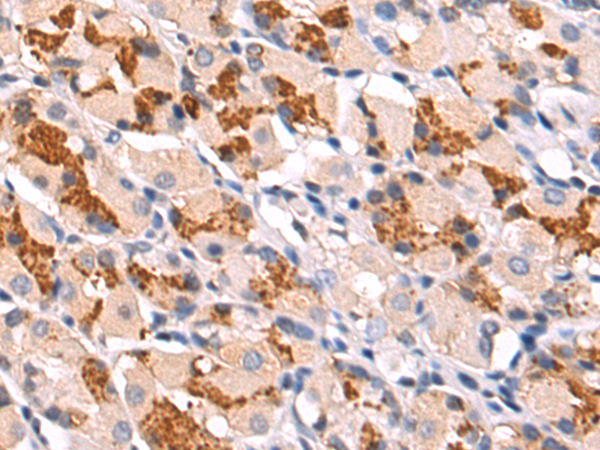

| WB | 咨询技术 | Human,Mouse,Rat |
| IF | 咨询技术 | Human,Mouse,Rat |
| IHC | 1/50-1/200 | Human,Mouse,Rat |
| ICC | 技术咨询 | Human,Mouse,Rat |
| FCM | 咨询技术 | Human,Mouse,Rat |
| Elisa | 1/5000-1/10000 | Human,Mouse,Rat |
| Aliases | PGQTL2 |
| WB Predicted band size | 53 kDa |
| Host/Isotype | Rabbit IgG |
| Antibody Type | Primary antibody |
| Storage | Store at 4°C short term. Aliquot and store at -20°C long term. Avoid freeze/thaw cycles. |
| Species Reactivity | Human, Mouse |
| Immunogen | Synthetic peptide of human GIPR |
| Formulation | Purified antibody in PBS with 0.05% sodium azide and 50% glycerol. |
+ +
以下是关于GIPR抗体的3篇参考文献及其摘要:
---
1. **文献名称**: *Antibody-mediated activation of the GIP receptor improves glucose homeostasis in mice*
**作者**: Samms, R.J., et al.
**摘要**: 该研究报道了一种特异性激活GIPR的单克隆抗体,通过体外和体内实验证明其能够增强葡萄糖刺激的胰岛素分泌,并在肥胖小鼠模型中改善糖耐量,提示其在2型糖尿病治疗中的潜在应用。
2. **文献名称**: *Structural basis of GIPR antibody antagonism for metabolic disease therapy*
**作者**: Kumar, S., et al.
**摘要**: 本研究利用冷冻电镜技术解析了GIPR与其拮抗性抗体的复合物结构,揭示了抗体结合表位及抑制受体活性的分子机制,为开发靶向GIPR的代谢疾病药物提供结构基础。
3. **文献名称**: *GIPR antibody therapy reduces food intake and adiposity in preclinical models of obesity*
**作者**: Nørregaard, P.K., et al.
**摘要**: 通过动物实验发现,阻断GIPR的单克隆抗体可显著减少高脂饮食诱导的肥胖小鼠的摄食量和脂肪积累,表明GIPR信号在能量平衡调控中的作用及其作为抗肥胖靶点的潜力。
---
以上文献聚焦于GIPR抗体的治疗机制(如激活/拮抗效应)、结构解析及在代谢疾病(糖尿病、肥胖)中的应用。如需更多文献或具体信息,建议通过PubMed或Sci-Hub等平台检索关键词“GIPR antibody”。
×